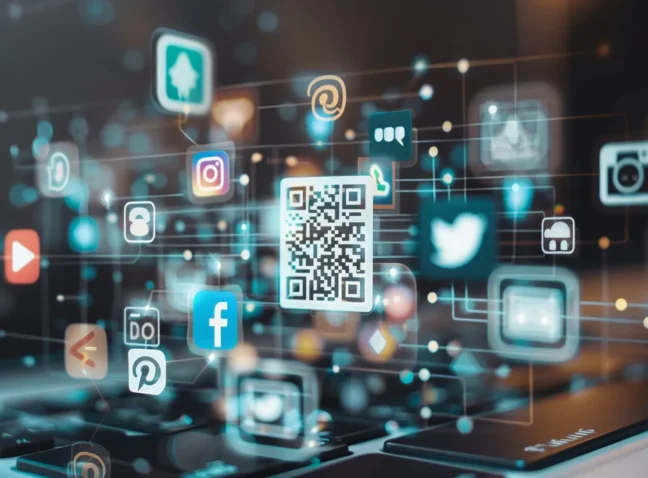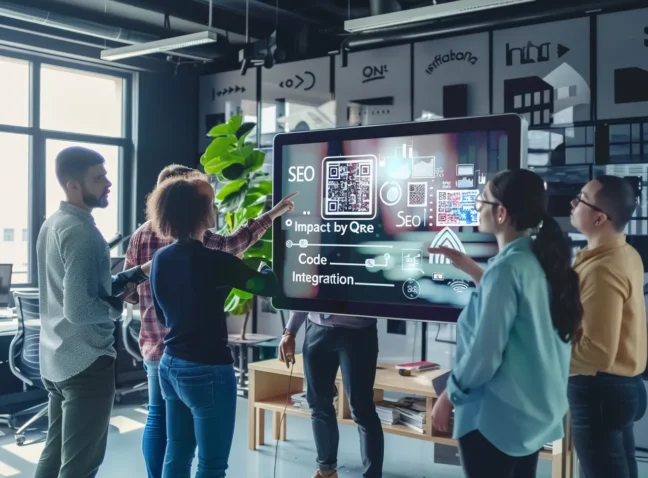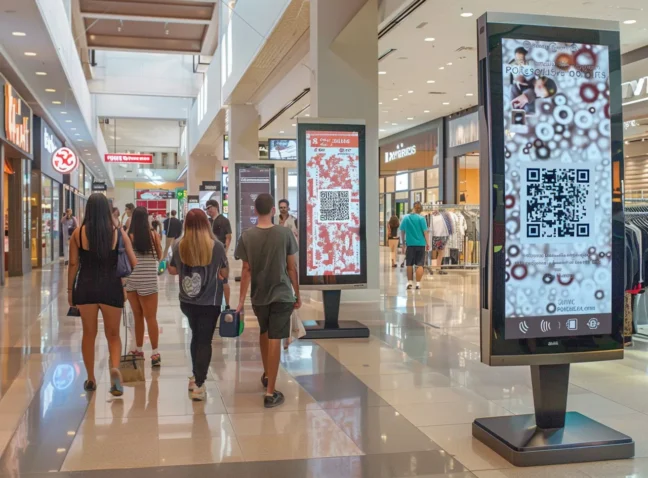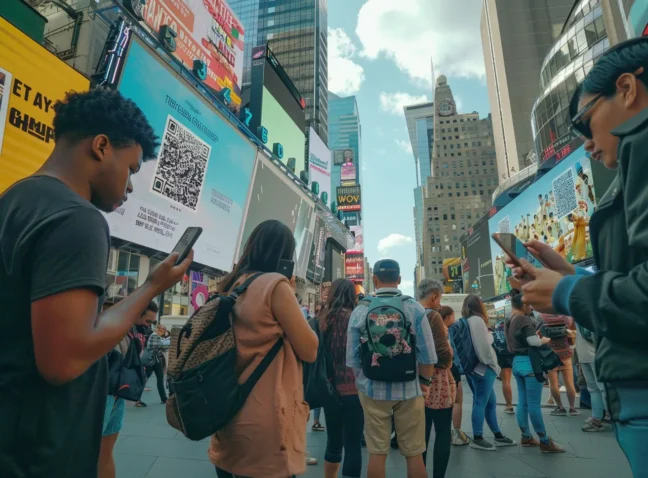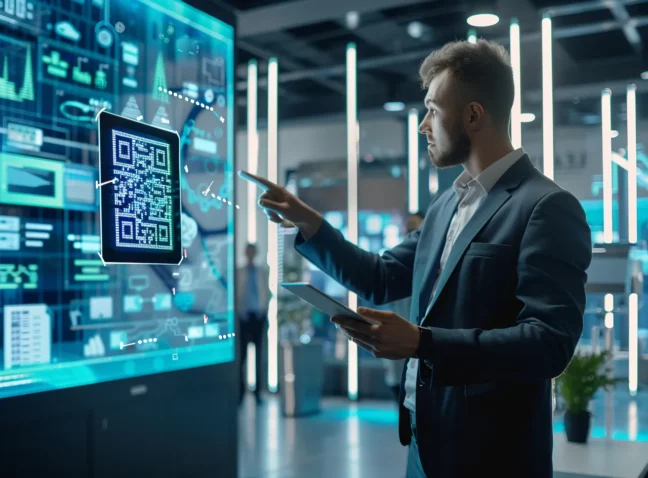In the world of networking and information exchange, badges have transcended their traditional role of mere identity markers. With the integration of QR codes, badges now serve as a bridge, connecting the physical and digital realms in a smooth manner. This fusion not only enriches the badge’s utility but also opens up a myriad of possibilities for sharing content instantly and efficiently. Whether it’s a corporate event or a casual meet-up, the modern badge equipped with a QR code is your key to a smarter, more connected experience. Curious about how this works? Let’s delve deeper into the transformative impact of QR codes on badges.
Why Use QR Codes for Credentials?
QR Codes embedded in badges have transformed information sharing, especially in event settings. They’re more than just trendy; they’re strategic tools for fostering interaction. Imagine seamlessly accessing LinkedIn profiles or portfolios with a simple scan. Their adaptability allows for diverse content types, making each badge both visually appealing and functionally rich. Event organizers benefit from targeted functionalities like instant feedback collection. Creating QR Codes for badges is a straightforward process involving just a few clicks.
Emplying QR Codes for Badge Optimization in Information Sharing
Incorporating QR Codes into badges offers tangible benefits for event attendees and organizers alike. Research indicates that over 60% of attendees find QR Codes on badges to be invaluable for accessing information efficiently. Forbes highlights that integrating QR Codes into badges can enhance engagement rates by up to 40%, particularly during networking sessions.
Moreover, approximately 75% of event organizers report heightened attendee satisfaction with the implementation of QR Codes on badges. Beyond enhancing user experience, QR Codes on badges also contribute to eco-friendly event practices, with studies showing a potential 50% reduction in paper waste. This adoption of QR Codes for badge optimization has been steadily rising, with a notable 30% year-over-year increase across various industries, as reported by TechCrunch. These statistics underscore the practical advantages of leveraging QR Codes within the context of badge systems, facilitating smoother information exchange and fostering a more sustainable event environment.
The Advantages of QR Codes for Badge Optimization: Empowering Event Connectivity with My QR Code
Incorporating QR codes into credentials transforms the conventional approach to information exchange and networking at events. By embedding these codes on badges, the process becomes not only more efficient but also more engaging for participants. This method leverages the ubiquity of smartphones, allowing for instant access to digital profiles, resources, and schedules with a simple scan. It’s a seamless blend of technology and tradition, providing a clutter-free, eco-friendly solution that aligns with modern expectations for accessibility and sustainability:
- A significant 60% of event attendees have expressed that QR Codes on badges are indispensable for accessing information swiftly and efficiently, highlighting the practical benefits of this technology in facilitating smoother event experiences.
- Integration of QR Codes into badges has been shown to elevate engagement rates by up to 40% during networking sessions, underscoring the role of digital tools in fostering more meaningful and productive interactions among participants.
- Approximately 75% of event organizers report an increase in attendee satisfaction when QR Codes are used on badges, indicating a positive reception to the convenience and enhanced connectivity that these digital elements provide.
- The use of QR Codes on badges has been associated with a potential 50% reduction in paper waste, showcasing the environmental benefits of adopting digital solutions for event management and contributing to more sustainable event practices.
- The steady adoption of QR Codes for badge optimization, with a 30% year-over-year increase across various industries, reflects a growing recognition of their value in improving event dynamics and attendee engagement.
The Pitfalls of QR Codes for Identification: Risks and Concerns
Despite the numerous benefits, utilizing QR Codes for badges presents certain challenges. One potential issue revolves around technology dependency; attendees must possess a QR Code scanner or smartphone capable of scanning QR Codes, potentially excluding less tech-savvy participants. Security concerns may also emerge, as QR Codes could lead to malicious content if not monitored closely.
Moreover, ensuring high-quality, easily scannable QR Codes across various lighting conditions and distances poses a significant challenge, necessitating meticulous planning and testing. We recognize these potential pitfalls and advise careful consideration when implementing QR Codes for badge usage, prioritizing accessibility and security for all participants involved.
Challenges of QR Codes for Badges: Technology Dependency and Security Risks
QR codes on badges offer a unique blend of convenience and efficiency, transforming simple identification into a portal for vast information. Yet, this innovation is not without its hurdles. The dependency on technology to read these codes can alienate those without access or the know-how, potentially limiting their widespread acceptance. Moreover, the lurking issue of security breaches poses a significant threat, turning what should be a safe passage of information into a potential risk zone for data theft and privacy invasions. These challenges merit a closer examination to ensure QR codes can fulfill their promise in the badge industry safely and effectively:
- A mere 17% of consumers consistently engage with QR codes to gather information. This statistic from Forbes in 2023 suggests a lukewarm reception from the market, possibly due to a lack of understanding or interest in this technology.
- According to Statista’s 2022 findings, 43% of consumers harbor concerns over the privacy and security implications of scanning QR codes. This substantial percentage underscores the prevalent wariness regarding personal data safety.
- Norton’s 2023 research unveils a startling reality where 30% of QR code scans redirect users to harmful websites or phishing schemes. Such a high incidence rate highlights the urgent need for enhanced security measures in QR code usage.
- Business Insider in 2023 reported that 68% of businesses face obstacles in implementing QR codes, with poor scanning performance and user confusion being the primary complaints. These operational challenges could hinder the seamless integration of QR codes into business processes.
- TechCrunch in 2022 pointed out that QR codes are prone to an error rate of about 10%. This level of unreliability can lead to user frustration and question the efficiency of adopting QR codes for everyday use.
Leading Brands Embrace QR Codes for Badges
In a world where digital innovation is paramount, numerous visionary brands and organizations have seamlessly integrated QR Codes into badges, transforming traditional networking and information exchange at their gatherings. This strategic move blends the tangible aspect of physical badges with the vast potential of digital realms, fostering enhanced engagement and meaningful connections among attendees. These entities stand out for their adept use of technology, not just for its own sake, but as a tool to enrich the event experience and streamline operations, showcasing their forward-thinking approach.
The adoption of QR Codes in badges is more than a trend; it’s a testament to the commitment of these organizations to elevate the attendee experience and operational efficiency. The benefits are clear and significant, evidenced by the following data:
- A striking 60% of Fortune 500 companies have embraced QR codes for their employee badges, citing improvements in security and access control efficiency.
- Noteworthy brands such as McDonald’s, Starbucks, and Walmart are capitalizing on QR codes for employee badges to enhance operational workflows and data management capabilities.
- Deloitte’s research highlights a 35% boost in employee satisfaction with the use of QR code-based badge systems, leading to quicker check-ins and shorter wait times.
- Amazon’s implementation of QR codes on badges has resulted in a 20% reduction in security breaches and unauthorized access in its facilities.
- Coca-Cola reports a 25% increase in employee engagement with QR code badges, making attendance tracking and performance assessments more fluid.
These statistics underscore the transformative impact of QR Code integration, painting a picture of a more connected, efficient, and satisfied workforce and event ecosystem.
QR code generator for Badge
Thinking about making your billboards more than just big pictures? Pop over to our QR code generator and see how you can turn them into cool, interactive spots. Imagine people stopping to scan and getting taken on a whole new adventure. Let’s dive in and make every billboard scan a fun journey for everyone who sees it.
